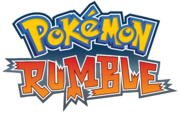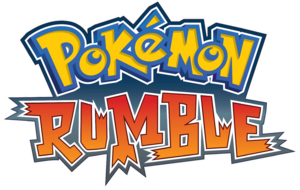Pokémon Rumble series: Difference between revisions
m (→Gameplay: grammar) |
Dialgafan1 (talk | contribs) (I hope this is okay. I added the table from the Pokémon games page. It makes the article look more neater in presentation.) |
||
| Line 11: | Line 11: | ||
The most recent entry in the series is [[Pokémon Rumble World]], which was released for the [[Nintendo 3DS]] on April 8, 2015 in North America, Europe, Australia, and Japan. Being released during [[Generation VI]], the game features all 719 species of Pokémon, as well as [[Mega Evolution]] and [[Primal Reversion]]. Unlike previous games, the freemium title features {{wp|Mii}}s who interact with Toy Pokémon. | The most recent entry in the series is [[Pokémon Rumble World]], which was released for the [[Nintendo 3DS]] on April 8, 2015 in North America, Europe, Australia, and Japan. Being released during [[Generation VI]], the game features all 719 species of Pokémon, as well as [[Mega Evolution]] and [[Primal Reversion]]. Unlike previous games, the freemium title features {{wp|Mii}}s who interact with Toy Pokémon. | ||
== | ==Games== | ||
{| style="background: #1d2c5e; {{roundy|10px}}; border: 5px solid #ffcb05" | |||
! style="background: #3467af; {{roundytl|5px}}" | {{color2|1d2c5e|Generation|Gen.}} | |||
! style="background: #3467af" | {{color|1d2c5e|Game}} | |||
! style="background: #3467af" | {{color|1d2c5e|System}}<!--Some use "console" to refer to the likes of the Wii and GameCube and use "handheld" to refer to the DS, GBA, etc. To prevent argument, don't change.--> | |||
! style="background: #3467af; {{roundytr|5px}}" | {{color|1d2c5e|First release}} | |||
|- style="text-align:center; background: #fff" | |||
! style="background: #{{sinnoh color dark}}" | {{color2|{{sinnoh color light}}|Generation IV|IV}} | |||
| [[File:Pokémon Rumble logo.png|180px]]<br>{{color2|000|Pokémon Rumble}} | |||
| [[File:Wii Logo.png|200px|Wii|link=Wii]] | |||
| June 16, 2009<br><small>Japan</small> | |||
|- style="text-align:center; background: #fff" | |||
! rowspan=2 style="background: #{{unova color dark}}" | {{color2|{{unova color light}}|Generation V|V}} | |||
| [[File:Rumble Blast US boxart.png|200px]]<br>{{color2|000|Pokémon Rumble Blast}} | |||
| [[File:Nintendo 3DS Logo.png|200px|Nintendo 3DS|link=Nintendo 3DS]] | |||
| August 11, 2011<br><small>Japan</small> | |||
|- style="text-align:center; background: #fff" | |||
| [[File:Pokémon Rumble U logo.png|200px]]<br>{{color2|000|Pokémon Rumble U}} | |||
| [[File:Wii U Logo.png|200px|Wii U|link=Wii U]] | |||
| April 24, 2013<br><small>Japan</small> | |||
|- style="text-align:center; background: #fff" | |||
! style="background: #{{kalos color dark}}" | {{color2|{{kalos color light}}|Generation VI|VI}} | |||
| [[File:Pokémon Rumble World logo.png|200px]]<br>{{color2|000|Pokémon Rumble World}} | |||
| [[File:Nintendo 3DS Logo.png|200px|Nintendo 3DS|link=Nintendo 3DS]] | |||
| April 8, 2015<br><small>Japan, North America,<br>Europe, Australia</small> | |||
|}{{-}} | |||
==Gameplay== | ==Gameplay== | ||
{{incomplete|section}} | |||
Each game in the series features [[Toy Pokémon]], Pokémon wind-up toys. The player begins with a Pokémon of their own, with gameplay mainly consisting of entering a stage and progressing through a number of different areas inside a predefined zone. Once the final area is reached, a boss is normally found, which must be defeated in order to complete the level. During a level, Pokémon may be obtained by the player, either randomly when defeating Pokémon, or by defeating a Pokémon while it is wobbly, guaranteeing obtaining that Pokémon. The player may also encounter a [[Battle Royale]] type stage, which involves defeating a number of Pokémon within a predefined time limit. During these stages, clocks may drop from defeated Pokémon, allowing for the timer to be extended. Often these also include "Powerful Rivals," which have more HP and are stronger than regular toy Pokémon. Also, in most versions of the game, the player is unable to switch Pokémon during battle royale. | Each game in the series features [[Toy Pokémon]], Pokémon wind-up toys. The player begins with a Pokémon of their own, with gameplay mainly consisting of entering a stage and progressing through a number of different areas inside a predefined zone. Once the final area is reached, a boss is normally found, which must be defeated in order to complete the level. During a level, Pokémon may be obtained by the player, either randomly when defeating Pokémon, or by defeating a Pokémon while it is wobbly, guaranteeing obtaining that Pokémon. The player may also encounter a [[Battle Royale]] type stage, which involves defeating a number of Pokémon within a predefined time limit. During these stages, clocks may drop from defeated Pokémon, allowing for the timer to be extended. Often these also include "Powerful Rivals," which have more HP and are stronger than regular toy Pokémon. Also, in most versions of the game, the player is unable to switch Pokémon during battle royale. | ||
==In other languages== | ==In other languages== | ||
Revision as of 02:47, 18 June 2015
The Pokémon Rumble series (Japanese: ポケモンスクランブル Pokémon Scramble) is a series of spin-off games currently consisting of four different titles. All the games in the series thus far have been developed by Ambrella.
History
The first game in the series, Pokémon Rumble, is a WiiWare game released in Japan on June 16, 2009, North America on November 16 of that year, and in Europe and Australia four days afterwards. The game features only Pokémon that were introduced in Generation I and IV. The Pokémon TCG: Rumble Game card collection was also released with the game.
Pokémon Rumble Blast, the second title in the series, was the first Pokémon game released for the Nintendo 3DS. It was released in Japan on August 11, 2011, North America on October 24, 2011, Europe on December 2, 2011, and Australia on December 8, 2011. It is also the only member of the series to be released in South Korea, having been released there on July 12, 2012. The game features all 646 Pokémon that were officially revealed at the time—all Pokémon as of Generation V with the exception of Keldeo, Meloetta, and Genesect.
On April 24, 2013, Pokémon Rumble U was released in Japan for the Wii U, making it the first and so far only Pokémon game released for the console. It was later released in Europe on August 15, 2013, Australia on August 16, 2013, and in North America on August 29, 2013. All 649 Pokémon from Generation I to Generation V are available in the game.
The most recent entry in the series is Pokémon Rumble World, which was released for the Nintendo 3DS on April 8, 2015 in North America, Europe, Australia, and Japan. Being released during Generation VI, the game features all 719 species of Pokémon, as well as Mega Evolution and Primal Reversion. Unlike previous games, the freemium title features Miis who interact with Toy Pokémon.
Games
| Gen. | Game | System | First release |
|---|---|---|---|
| IV |  Pokémon Rumble |

|
June 16, 2009 Japan |
| V |  Pokémon Rumble Blast |
August 11, 2011 Japan | |
 Pokémon Rumble U |

|
April 24, 2013 Japan | |
| VI |  Pokémon Rumble World |
April 8, 2015 Japan, North America, Europe, Australia |
Gameplay

|
This section is incomplete. Please feel free to edit this section to add missing information and complete it. |
Each game in the series features Toy Pokémon, Pokémon wind-up toys. The player begins with a Pokémon of their own, with gameplay mainly consisting of entering a stage and progressing through a number of different areas inside a predefined zone. Once the final area is reached, a boss is normally found, which must be defeated in order to complete the level. During a level, Pokémon may be obtained by the player, either randomly when defeating Pokémon, or by defeating a Pokémon while it is wobbly, guaranteeing obtaining that Pokémon. The player may also encounter a Battle Royale type stage, which involves defeating a number of Pokémon within a predefined time limit. During these stages, clocks may drop from defeated Pokémon, allowing for the timer to be extended. Often these also include "Powerful Rivals," which have more HP and are stronger than regular toy Pokémon. Also, in most versions of the game, the player is unable to switch Pokémon during battle royale.
In other languages
| |||||||||||||||||||||

|
This game-related article is part of Project Games, a Bulbapedia project that aims to write comprehensive articles on the Pokémon games. |
